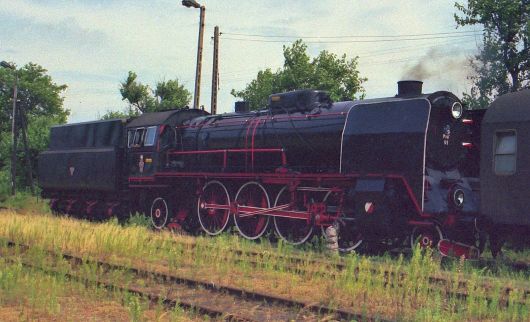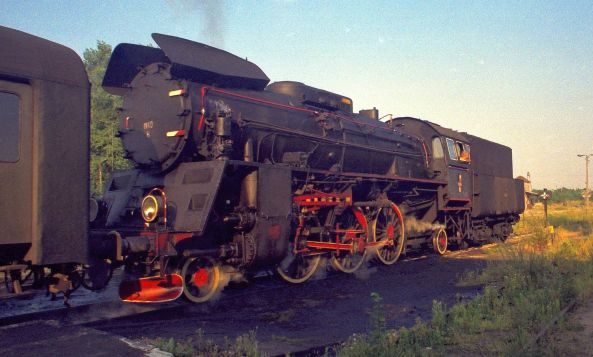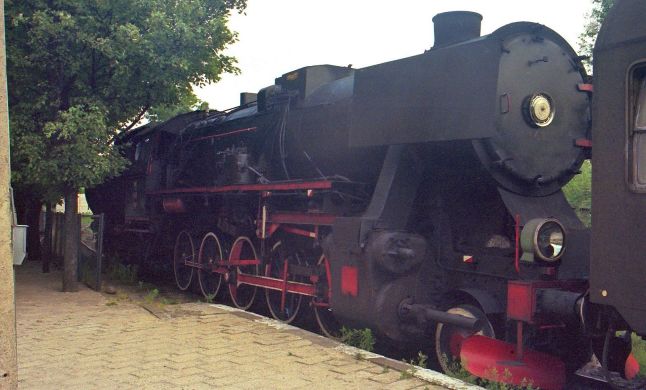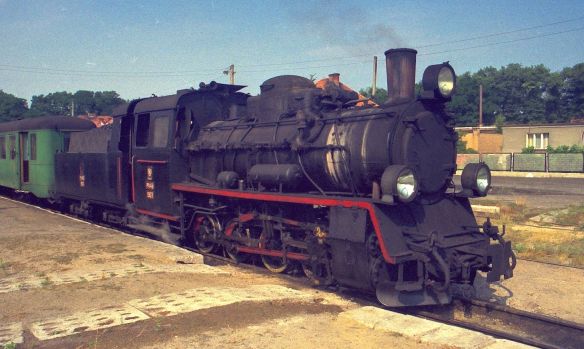
thirty years ago
In May 1991 I was offered a chance to join my father and visit Poland to ride behind some of the last active steam locomotives of the Polish State Railway, (PKP). Poland had until November 1989 been hidden behind the Iron Curtain, where only the most intrepid travelers would go. But even in the years after the collapse of Communist Poland the move away from socialism was slow and during the visit there were still visible signs of the old way of life with Western Shops selling specialty items and Soviet soldiers wandering around the railway stations.
It was decided the best way to get to Poland was to take the train from Berlin and after crossing the former East Germany the train crossed the border at the town of Frankfurt an der Oder. There had been reports in the weeks leading up to my visit that steam was still plentiful and could be seen in regular use but sadly by the time of my visit it had mostly vanished, all that was seen in service from the train to Poznan were Romanian built diesels and Polish built electrics.
The only steam that was seen from that train were two preserved engines on display at stations, the first was a Polish built Ty51 2-10-0 mounted at Rzepin station near the German border. These engines had been based upon an American design that had been delivered in the years after World War Two. This was followed ninety kilometres later by an ex German class Tp3 0-8-0 at the town of Zbąszynek. This engine was one of over a thousand examples built from 1902 to 1913 for use in various countries.
But the trip was not in vain for seventy-five kilometres southwest of Poznan is the town of Wolsztyn and while nowadays the name is synonymous with the working railway museum, in August 1991 it was still an operating steam depot, one of several left in Poland at the time. The most common class in use was the Ol49 2-6-2. At the time of the visit steam hauled services from Wolsztyn headed to Zbąszynek, Opalenica, Nowa Miasteczko, and Sulechów while diesel hauled services were to Leszno and Poznan. The best part of Wolsztyn was that for the right amount of money, or cigarettes, they would happily wave you up into the cab and even let you drive the steam locomotive.
After exploring the area around Wolsztyn the decision was made to look for steam elsewhere and the first place visited was Zbąszynek depot, but aside from the aforementioned Tp3 at the station there were no other steam engines to be found. With nothing else found north of Wolsztyn it was time to look to the south and almost one hundred kilometres to the southwest is Zagan, site of the famous camp Stalag Luft III and the mass POW escape in March 1944 that inspired the 1963 Hollywood movie ‘The Great Escape’. But for the inmates seen in Zagan there would be no escape and we were greeted by the remains of several partially cut Ty2’s while nearby several other engines, including a pair of Pt47’s, awaited their date with the cutter’s torch. In the end the only other standard gauge steam hauled trains seen were on the Jarocin – Czempiń line, located southeast of Poznan, and these were pulled solely by Ol49’s.
Not finding anything else on the standard gauge attention turned to the narrow gauge. In the early 1990’s there was still a plethora of narrow gauge lines in Poland and while the first two we visited, the Opalenica and the Smigiel lines had no activity, the third line we visited, from Środa to Zaniemyśl, was still active. Originally part of the meter gauge Średzka Kolej Powiatowa that had extended to Poznan the majority of the lines had been closed in the early 1950’s with the surviving sections converted to 750 mm. The trains along this line were pulled by the relatively modern Px48 0-8-0 which were built for a variety of gauges across the country.
Before leaving Poland a brief visit was made to Poznan depot but sadly the only steam engine we saw was a single Ty5 2-10-0, ex German class 50, that we could not get close to. After a fun week exploring only a fraction of Poland it was time to return to Berlin but that one week started a love affair with the Polish State Railways, one that I still have to this day.
| Steam locomotive classes seen - August 1991 | ||
| Class | Wheel Arrangement | Notes |
| Ok1 | 4-6-0 | ex Prussian P8 |
| Ok22 | 4-6-0 | based on Prussian P8 |
| Ol49 | 2-6-2 | last passenger engines built for Poland |
| Tp3 | 0-8-0 | ex Prussian G8 |
| Pt47 | 2-8-2 | based on pre-war Polish built Pt31 |
| Ty2 | 2-10-0 | ex German 52 ‘Kriegslok’ |
| Ty3 | 2-10-0 | ex German 42 |
| Ty5 | 2-10-0 | ex German 50 |
| Ty42 | 2-10-0 | Polish built 52 |
| Ty43 | 2-10-0 | Polish built 42 |
| Ty45 | 2-10-0 | based on pre-war Polish built Ty37 |
| Ty51 | 2-10-0 | based on American built Ty246 |
| TKt48 | 2-8-2T | Polish design |
| Px48 | 0-8-0 | narrow gauge |



